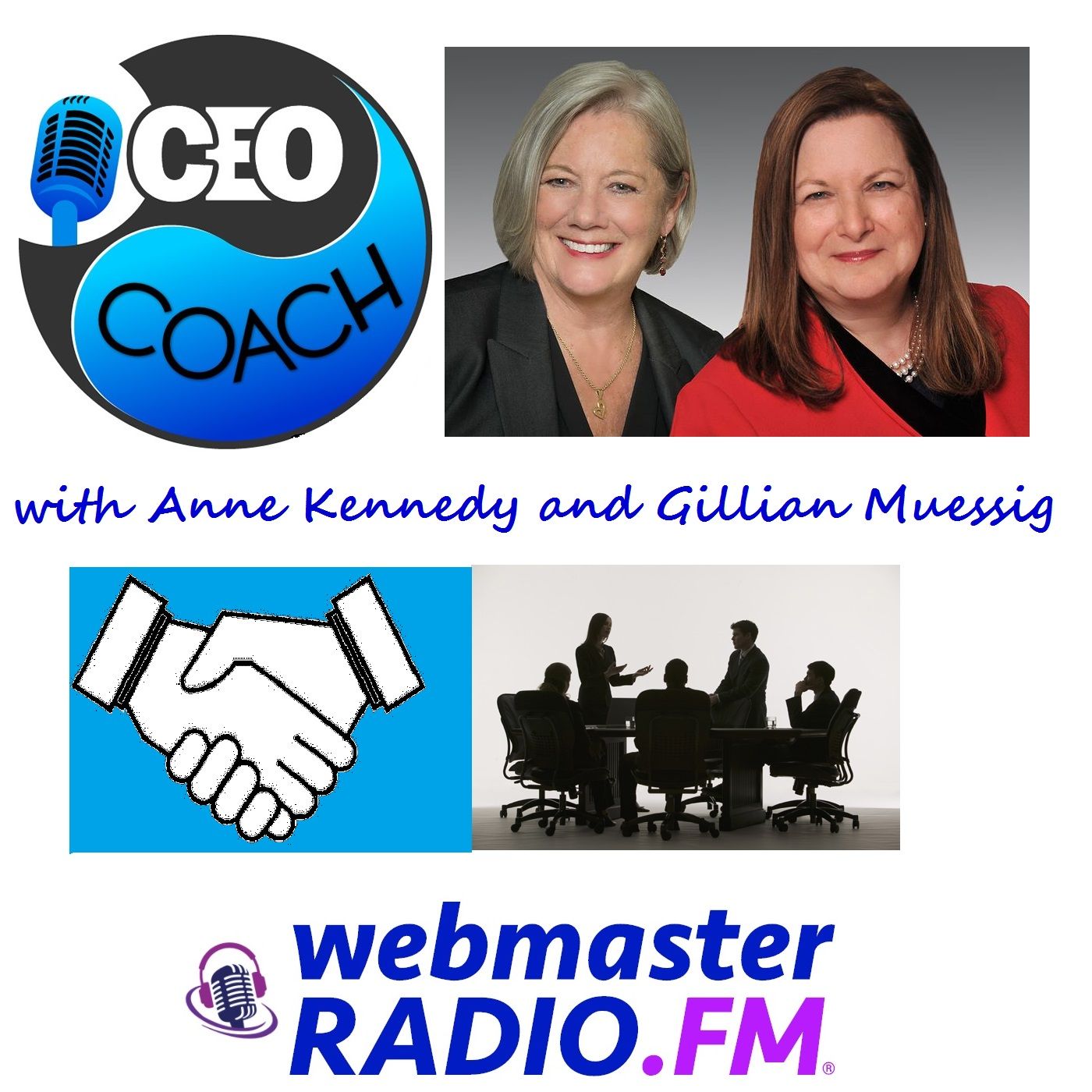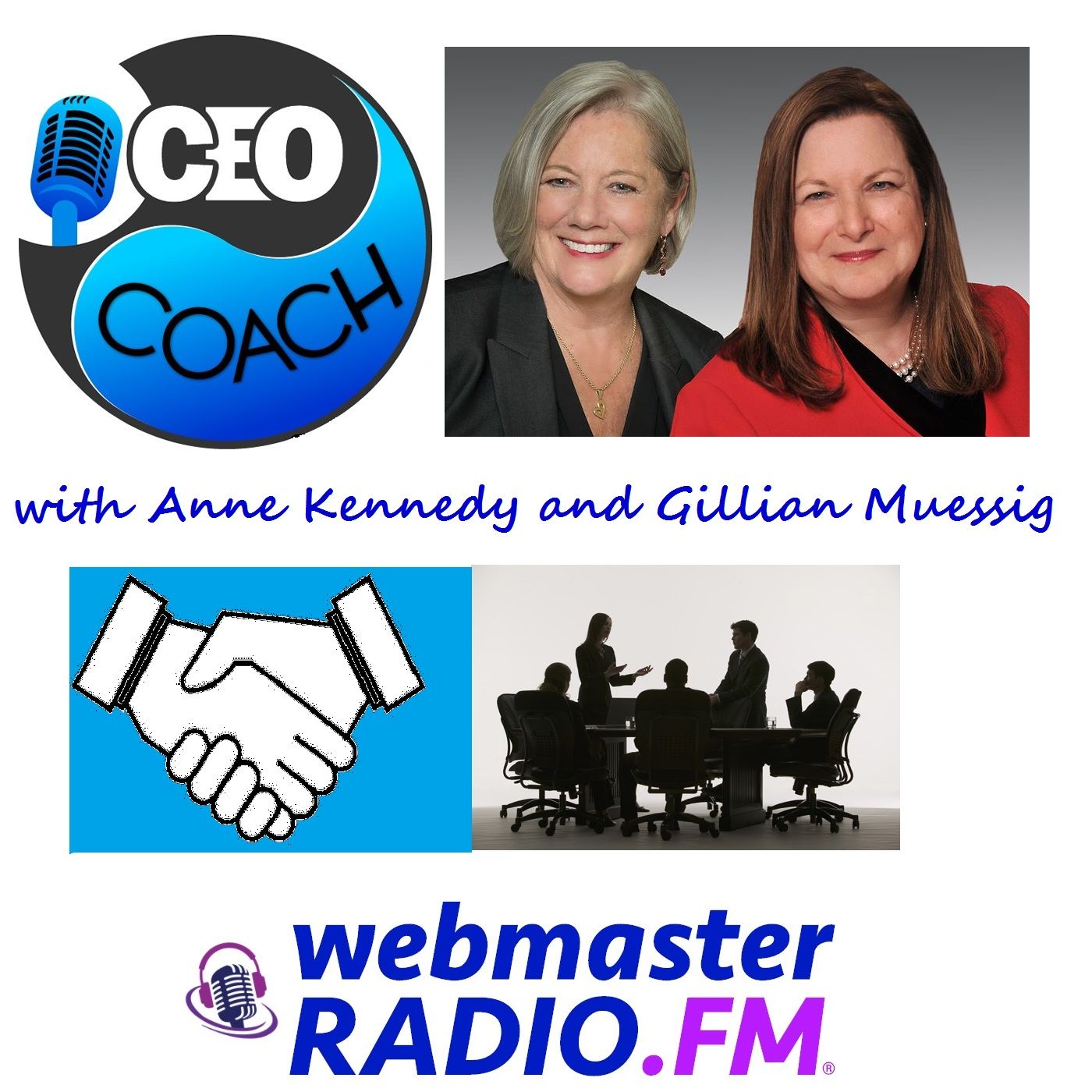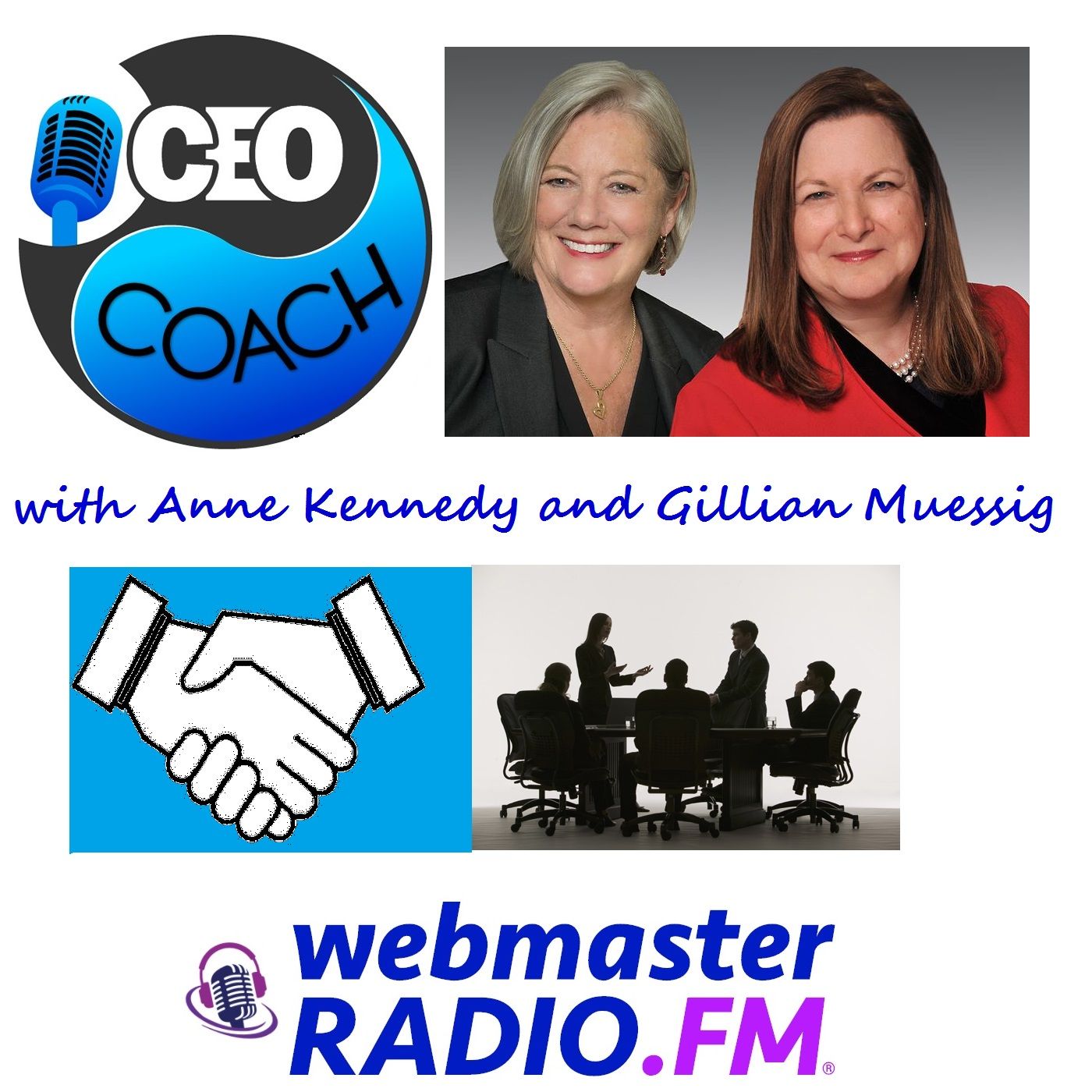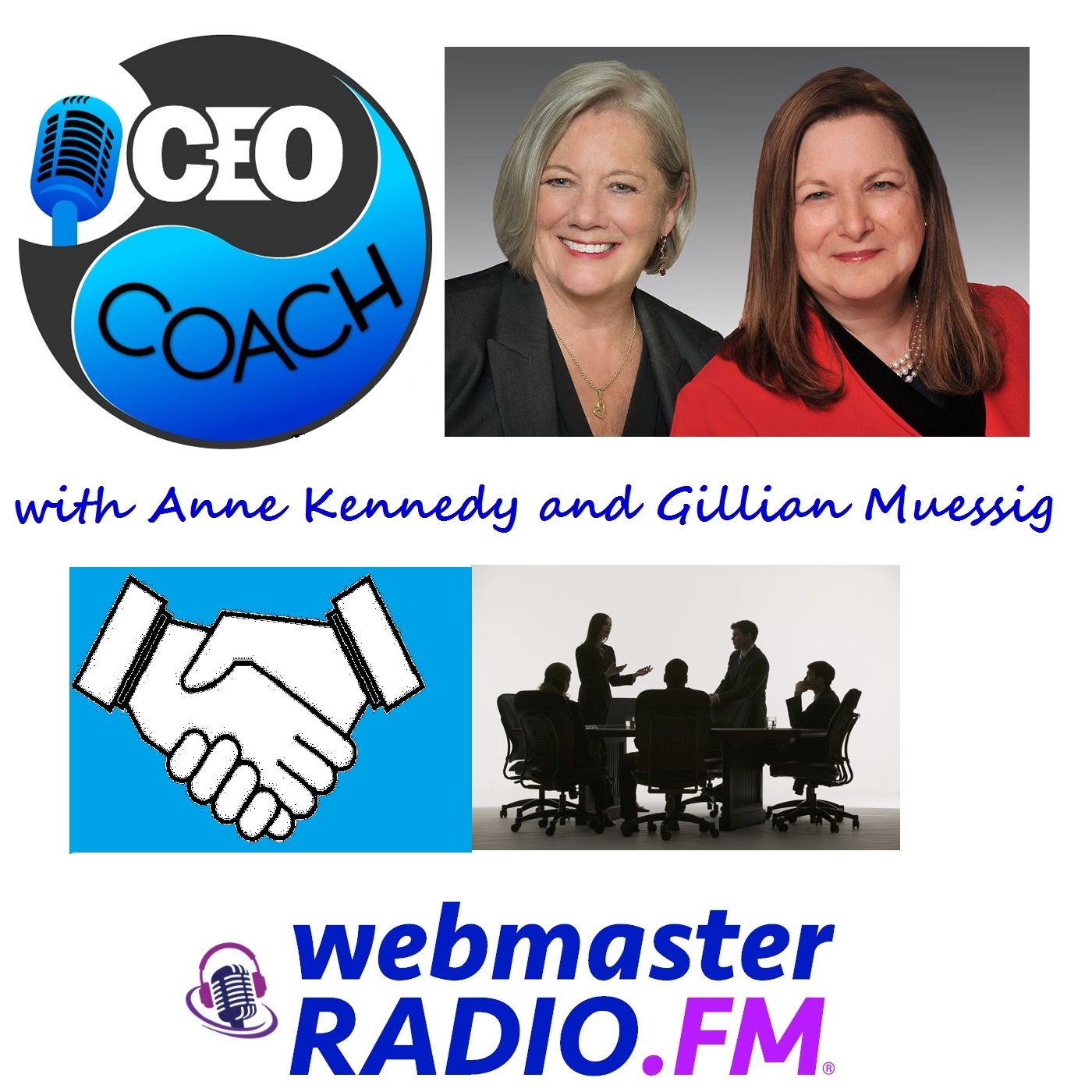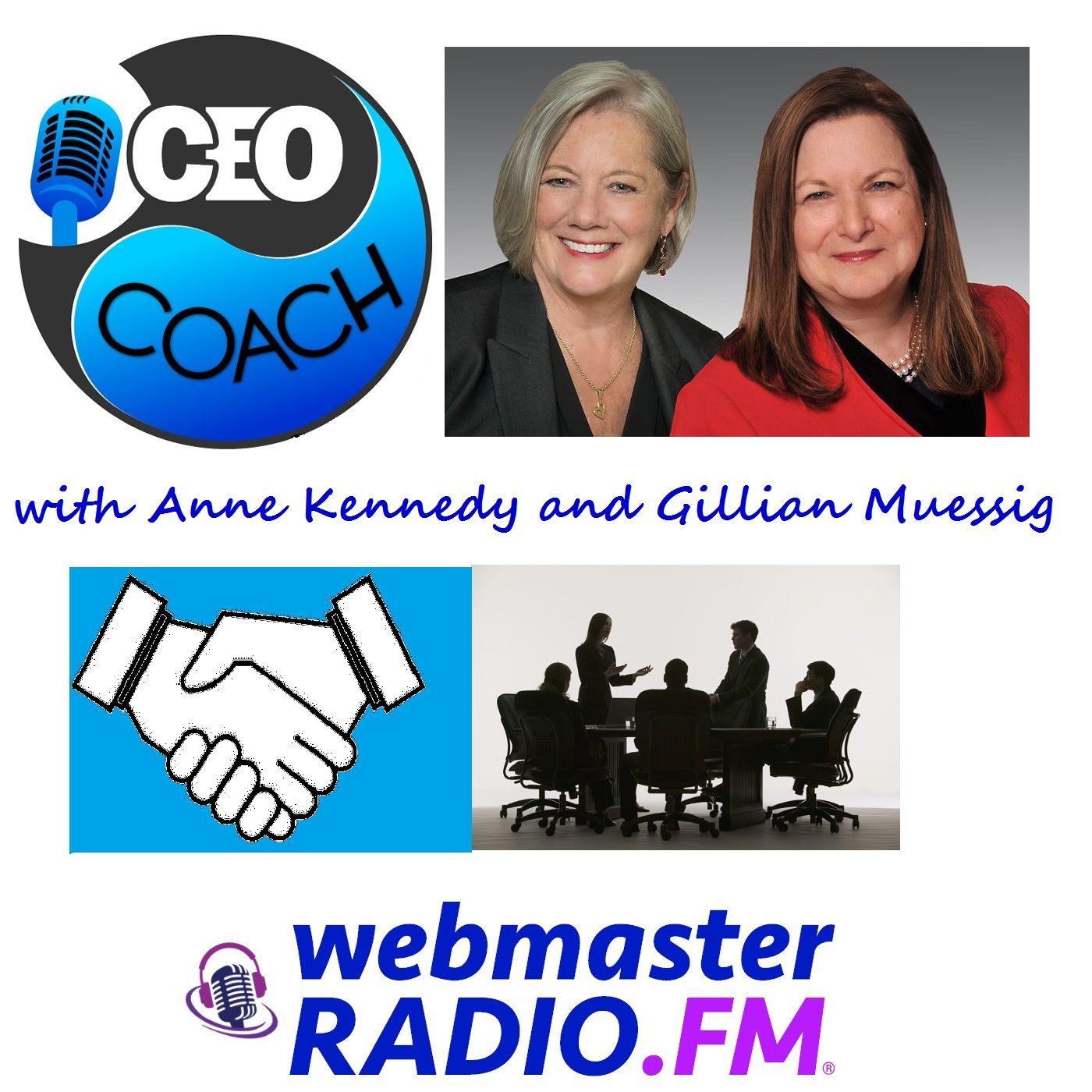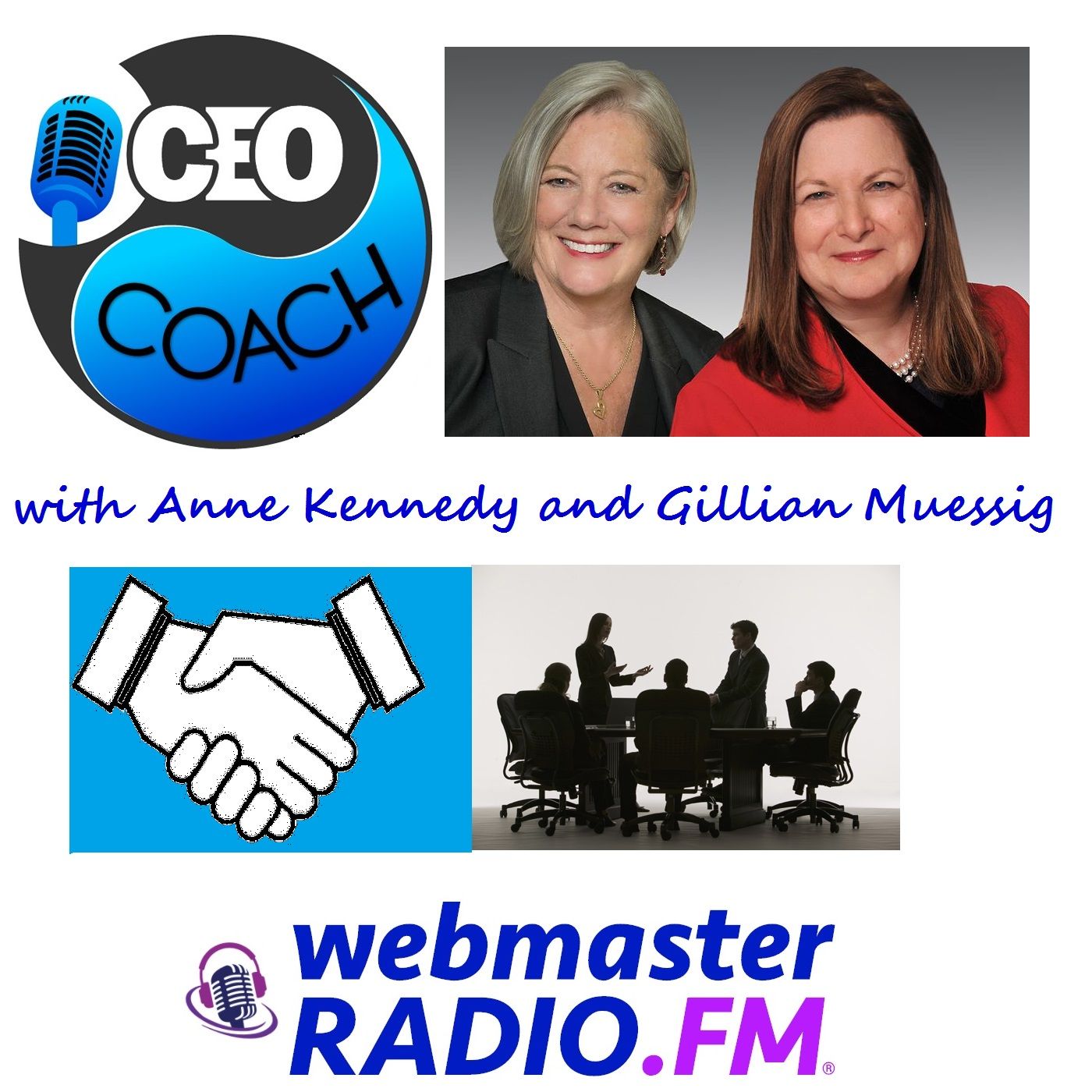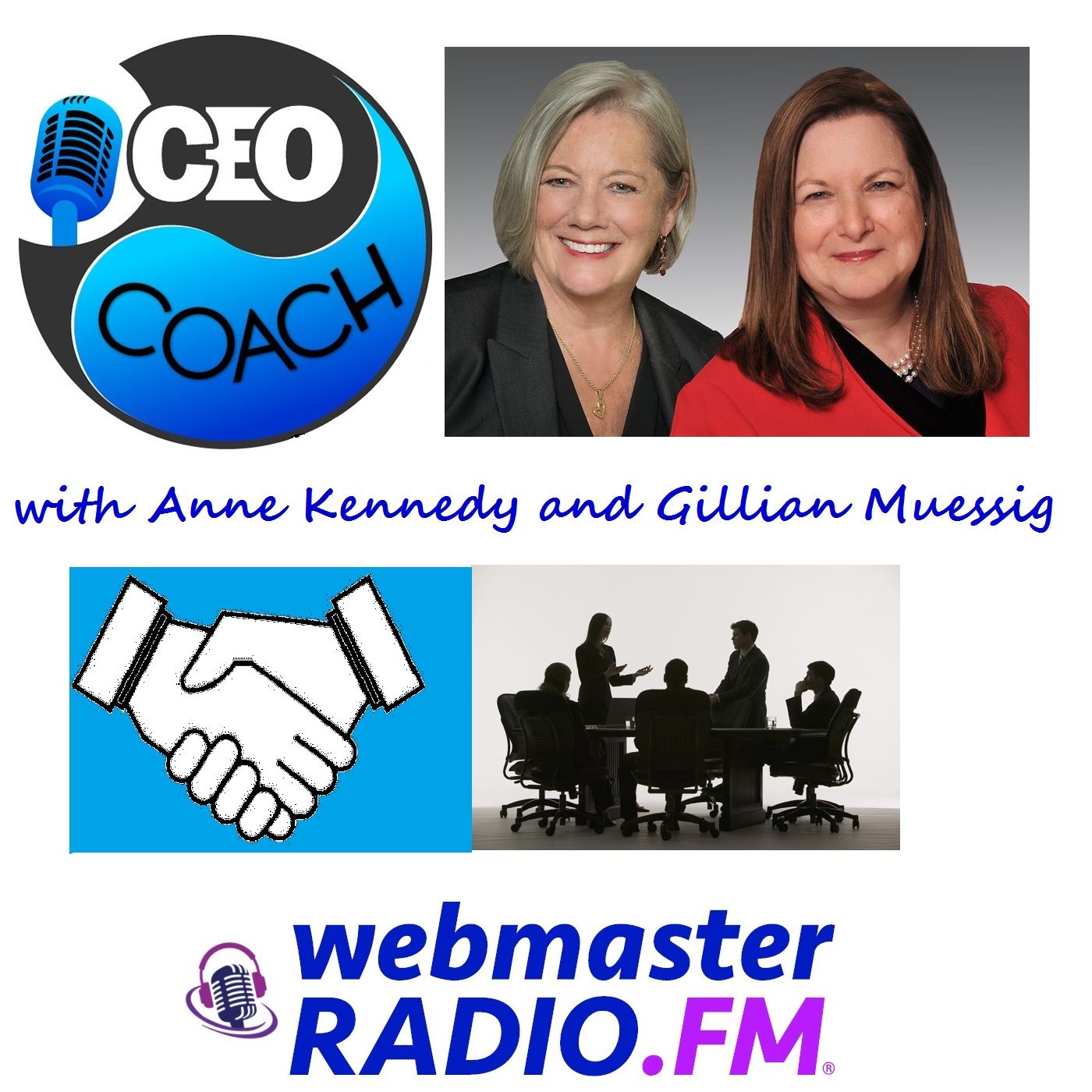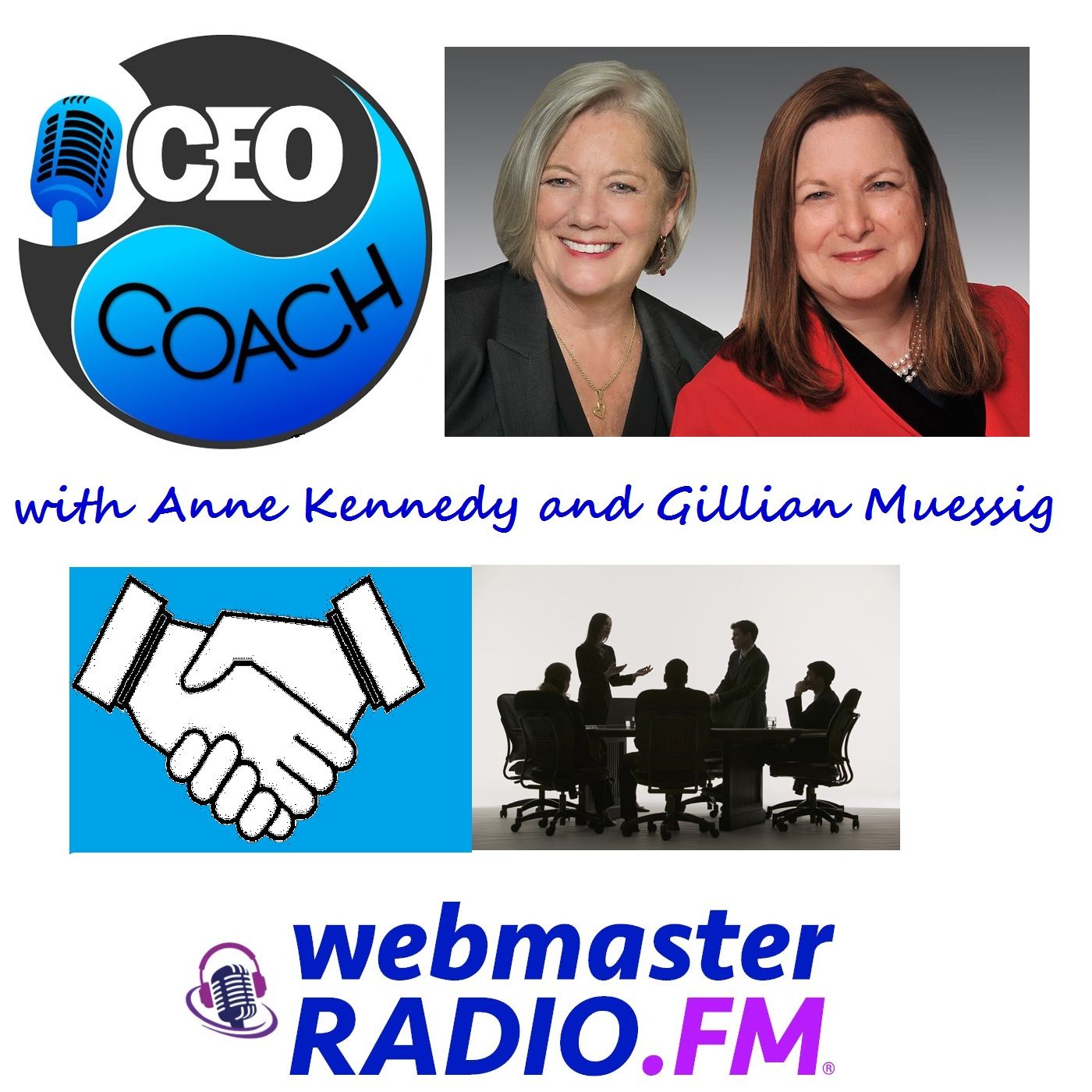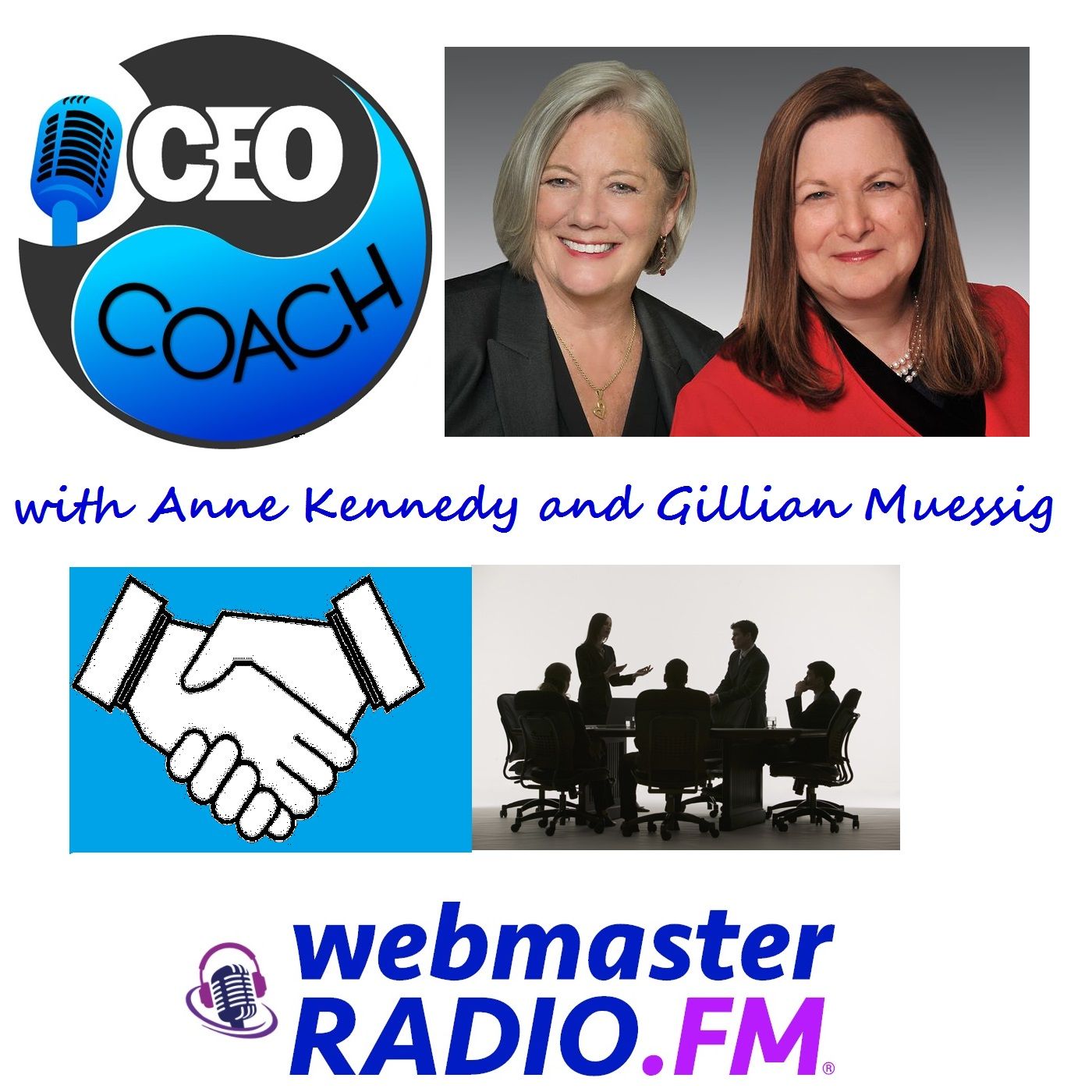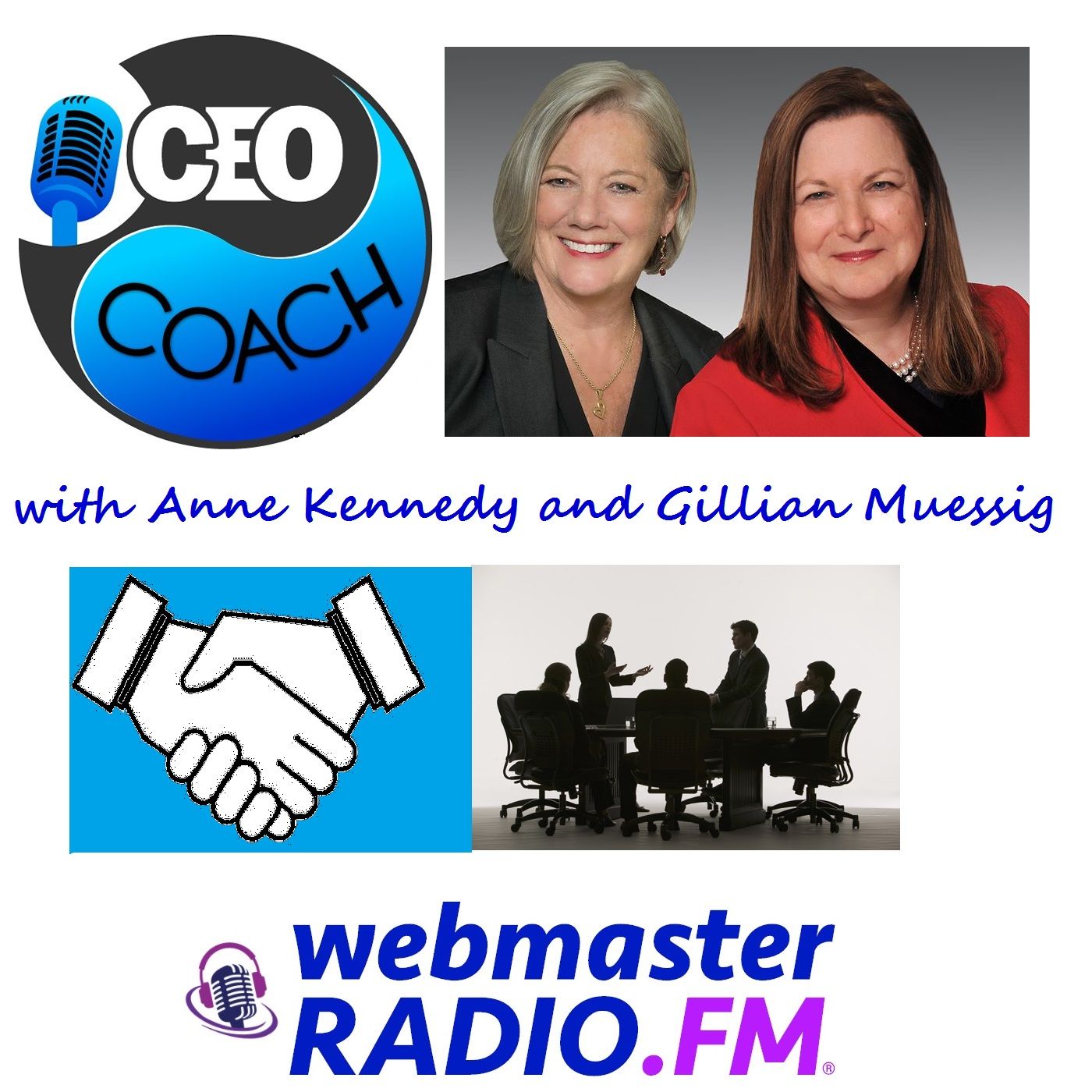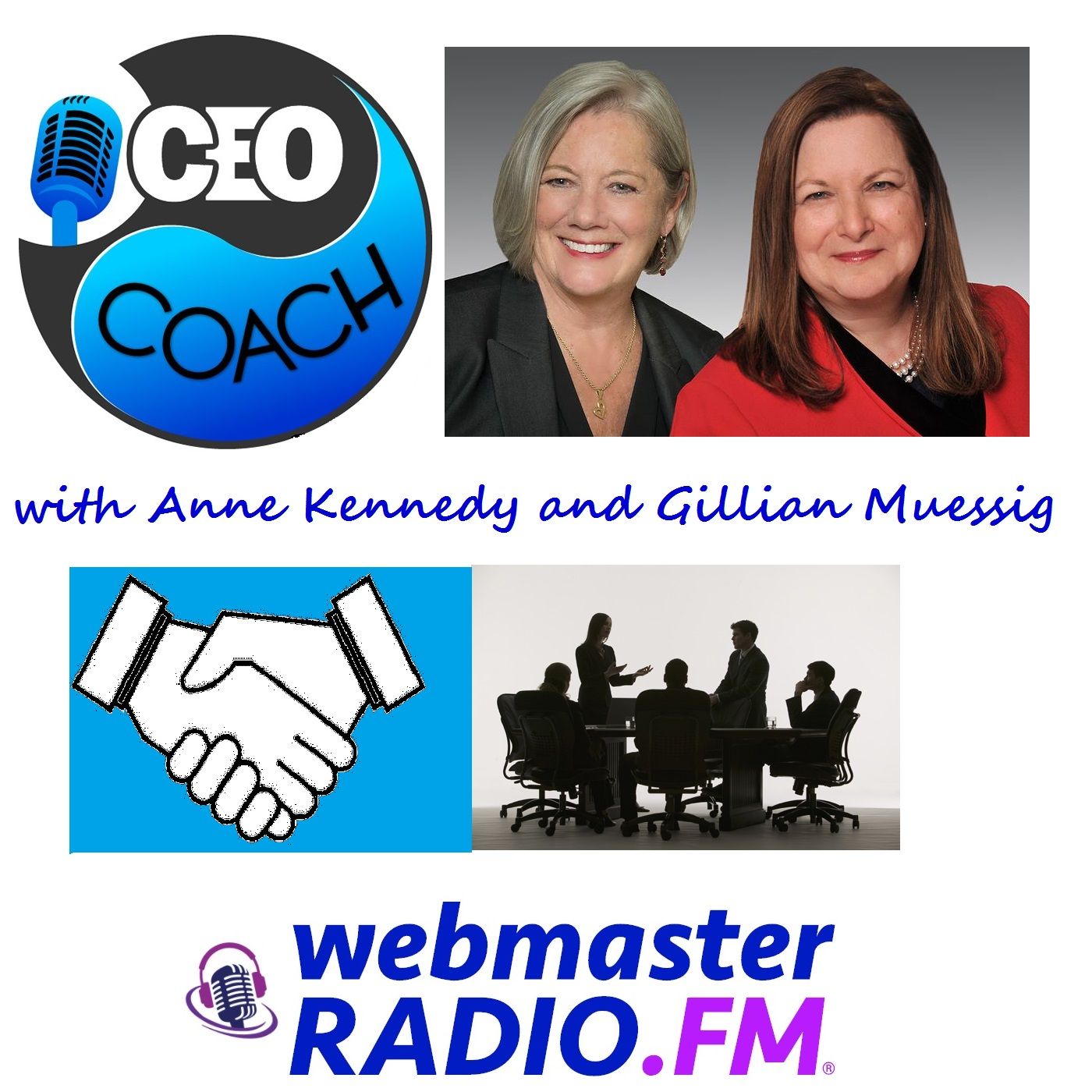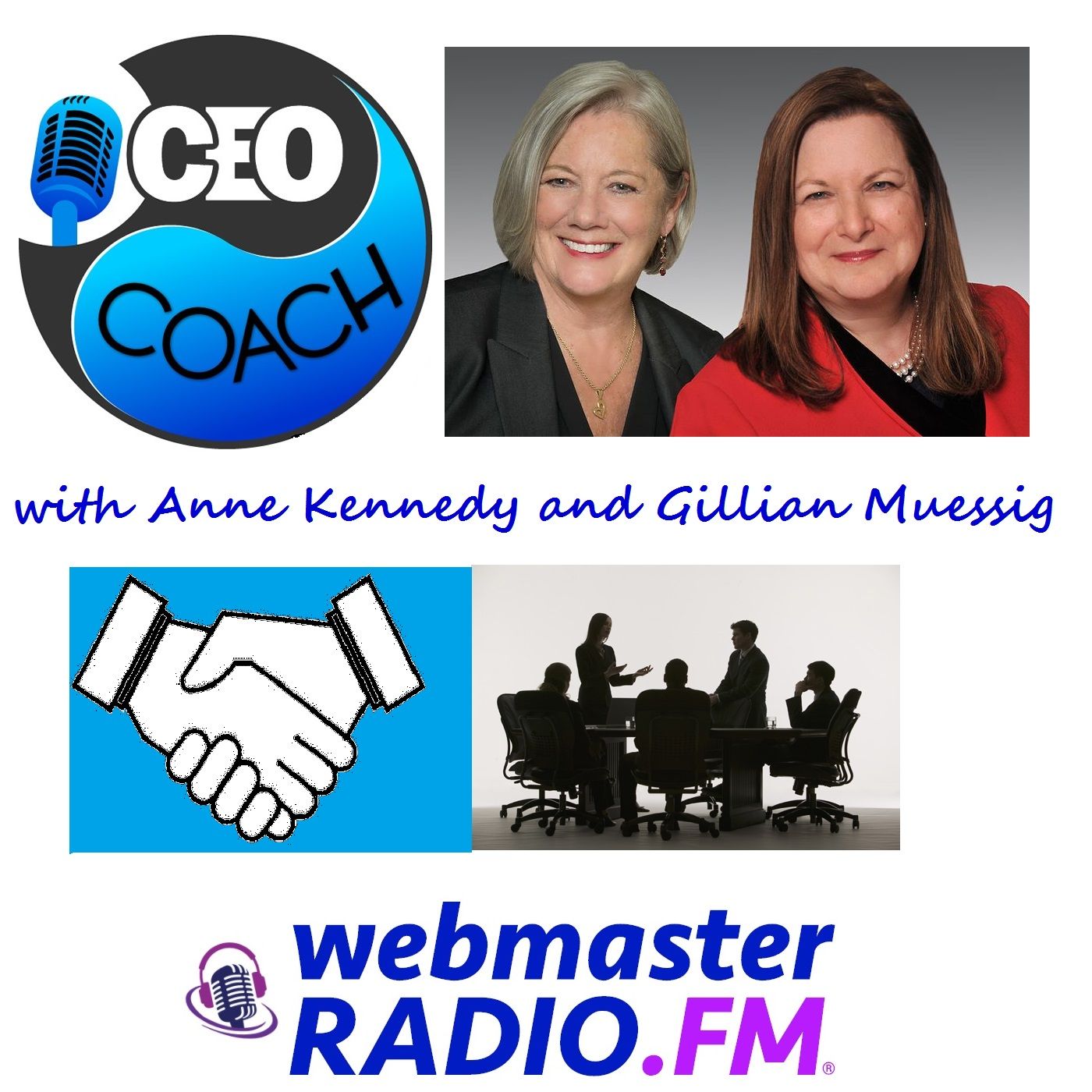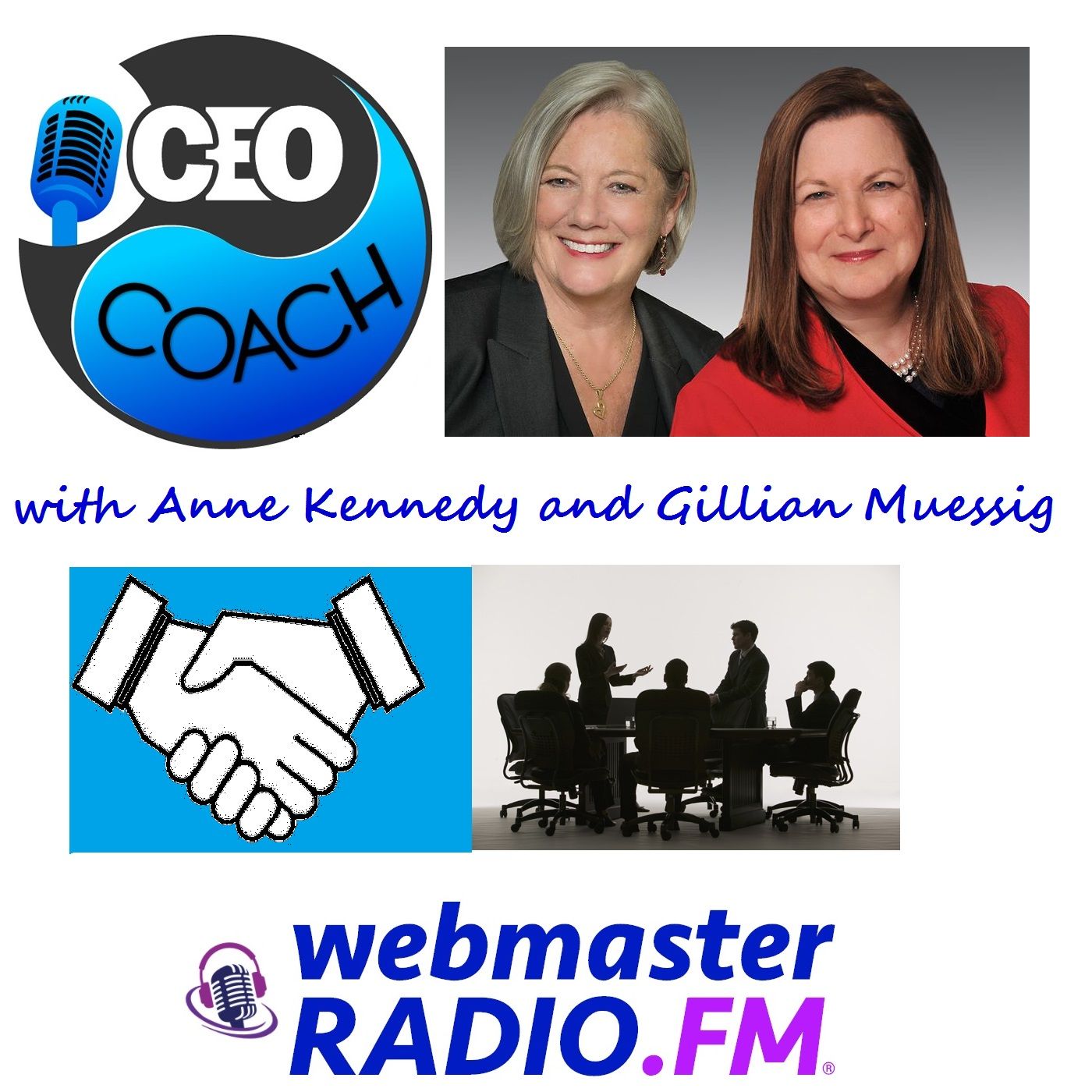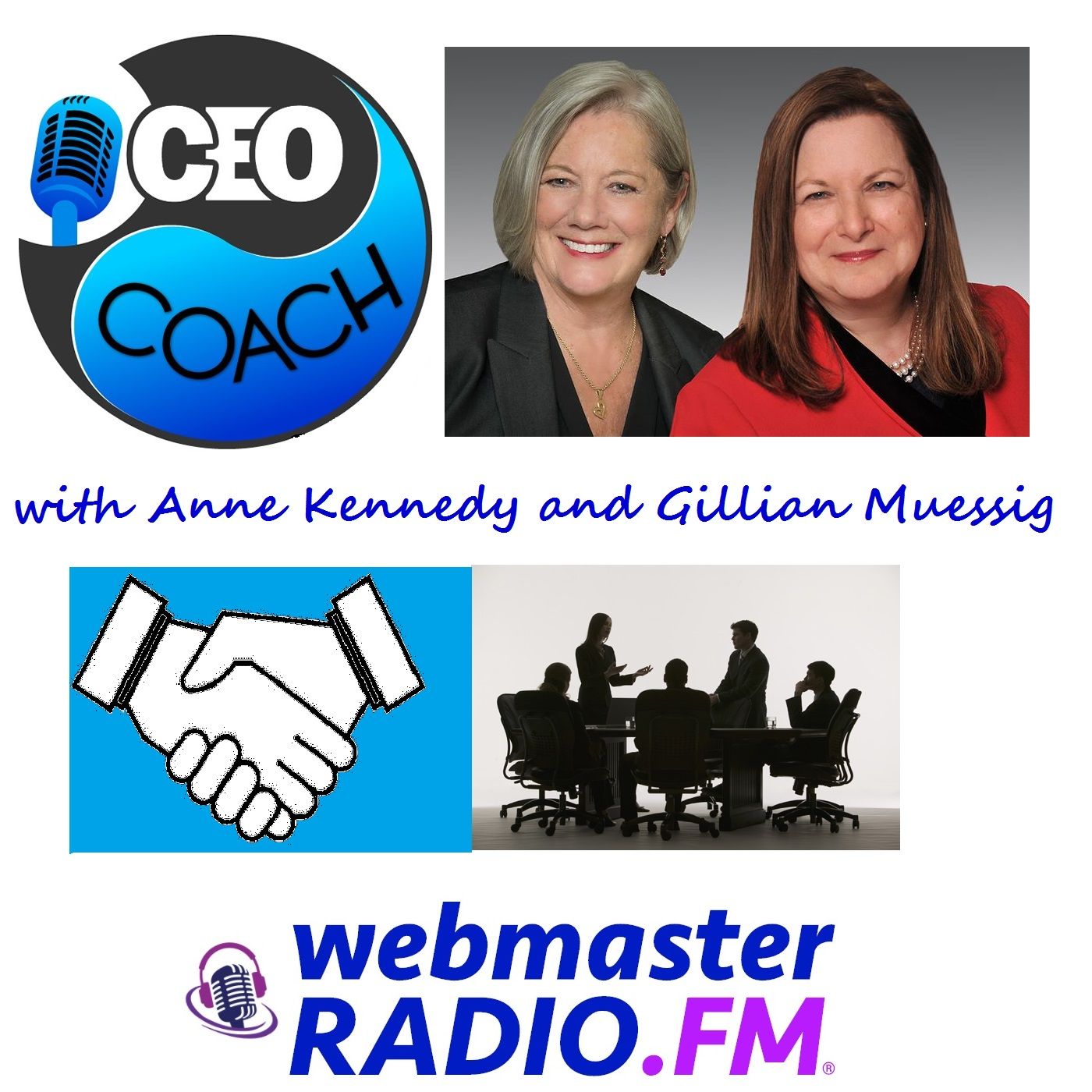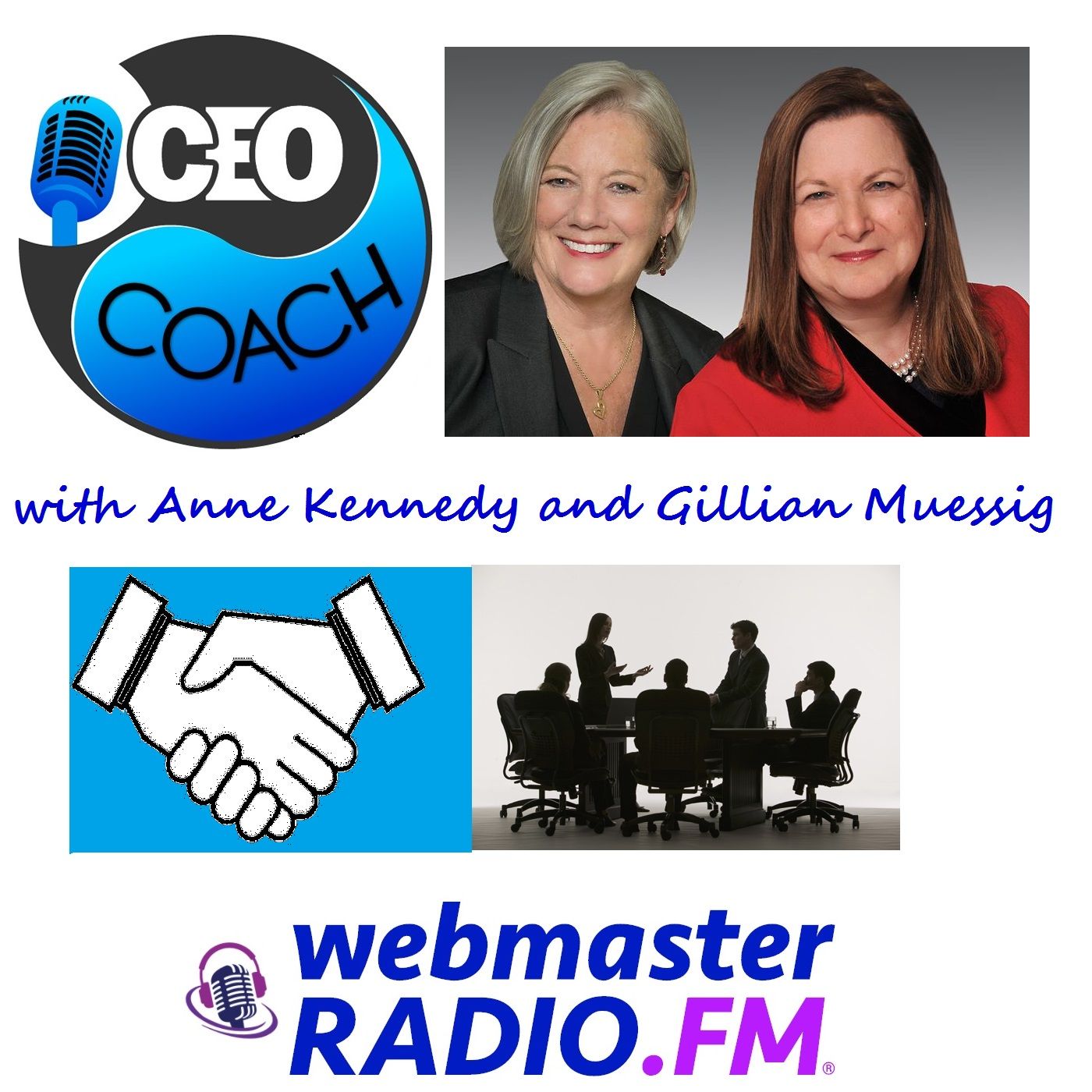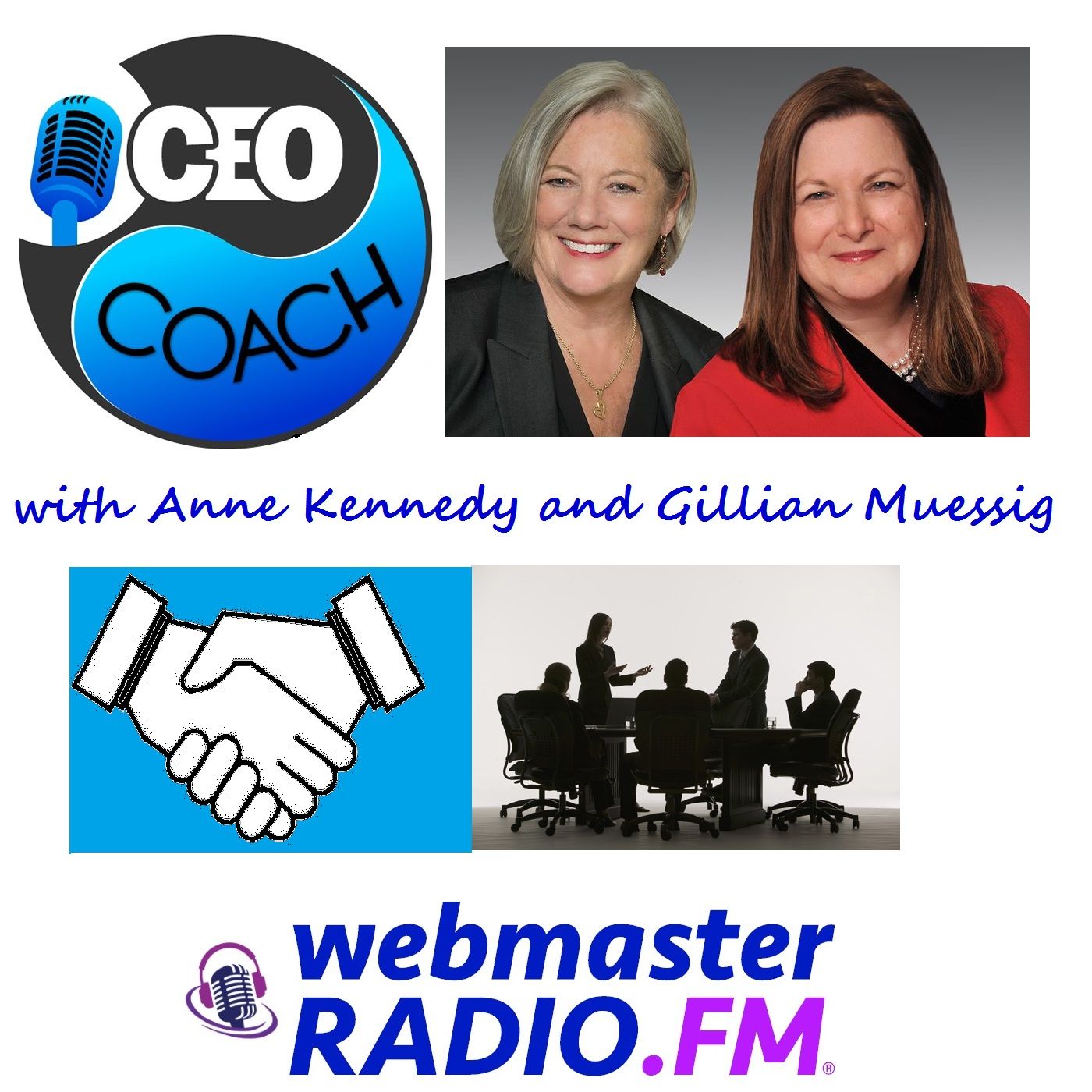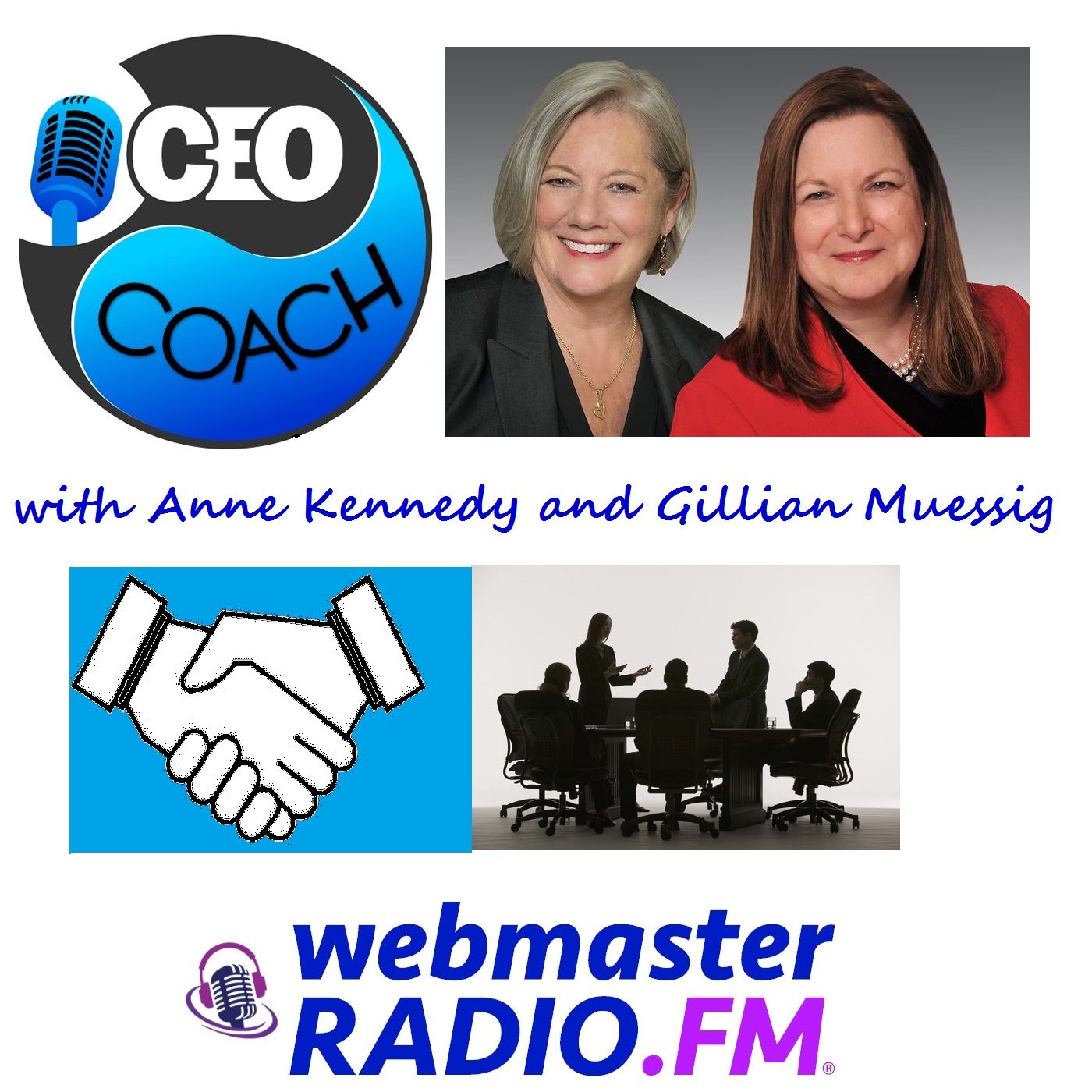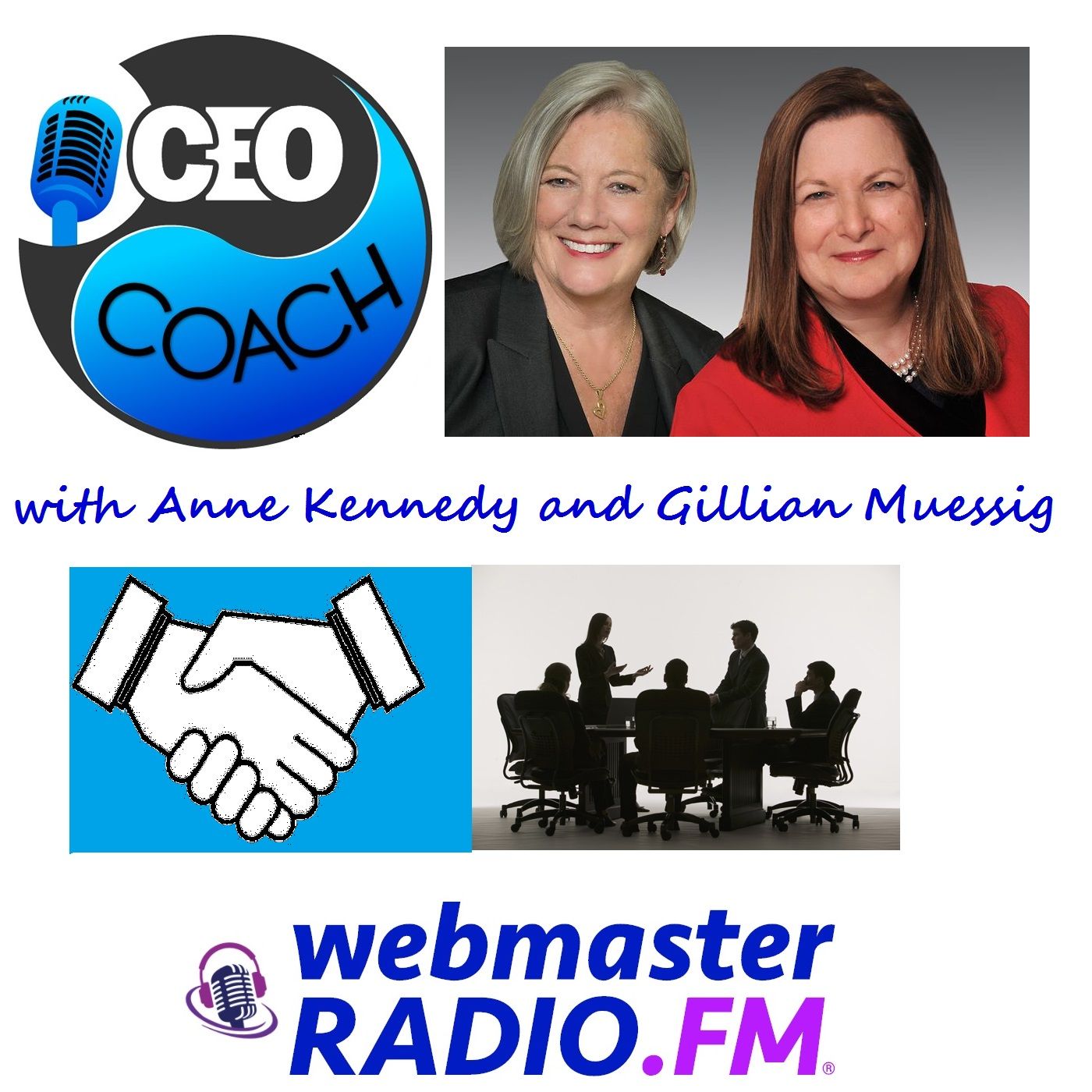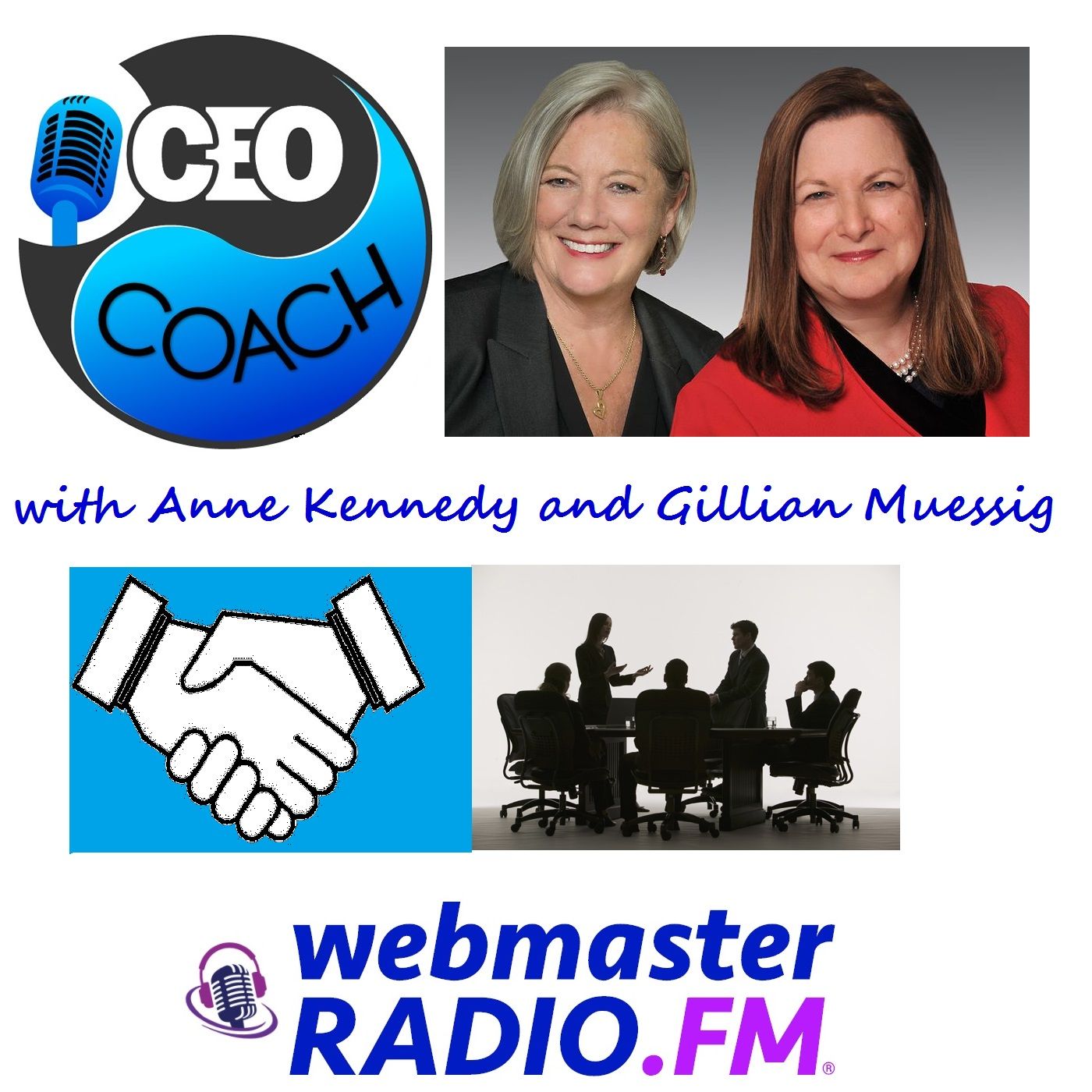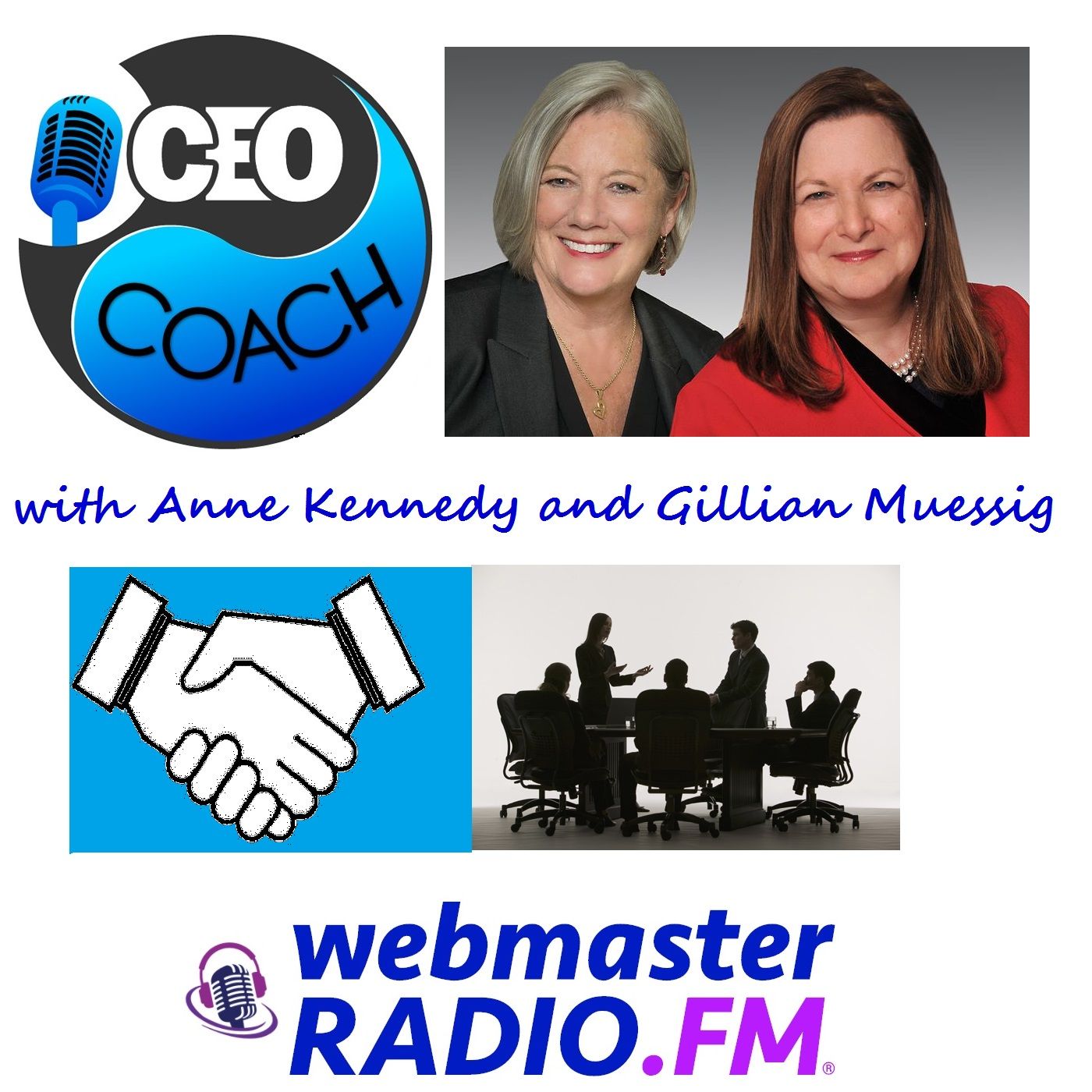Discover CEO Coach
CEO Coach

CEO Coach
Author: WMR.FM
Subscribed: 71Played: 908Subscribe
Share
© Copyright WMR.FM - All Rights Reserved
Description
Everything you need to do business on the web. From funding to finance, setup to staffing, branding to biz-dev, co-hosts Gillian Muessig and Anne Kennedy have between them, more than 50 years of success in nurturing businesses to become global brands. Gillian co-founded Moz and serves on boards on four continents. Anne was a founding board member of Helium.com and guided numerous Internet start-ups, including Zillow. Together, and with occasional guest experts, they break down the art of small business from the ground up.
377 Episodes
Reverse
As Gillian and Anne warp up 11 years of CEO Coach they address the essential elements of real leadership. Every CEO must lead with empathy, structure, and comfort with not knowing all the answers. While the duo is leaving CEO Coach, they are not going far. Watch this space for Gillian and Anne's new podcast 'VC Confidential', launching soon. Meanwhile, all the CEO coach podcasts you know and love will to be available right here on WMR FM.
Advertising Inquiries: https://redcircle.com/brands
Privacy & Opt-Out: https://redcircle.com/privacy
Gillian and Anne share some excellent tactical advice from Cascadia Capital in a recent Geekwire article. In addition to exhibiting strong empathic leadership, there are several additional actions CEOs can take to ensure durability through this crisis. From stabilizing your finances to protecting your team, these insights from Cascadia provide valuable guide rails as you plan for today, tomorrow, and long after.
Advertising Inquiries: https://redcircle.com/brands
Privacy & Opt-Out: https://redcircle.com/privacy
In times of crisis, like right now, CEOs find themselves frustrated by general advice. “But what do I DO!?” entrepreneur leaders ask. Leaders always deal with ambiguity—it’s timeless and comes with the job. During crises, ambiguity becomes exponential. As fear becomes contagious across organizations, leaders must manage their own responses to ambiguity. Gillian and Anne talk about how to do so in your company...
Advertising Inquiries: https://redcircle.com/brands
Privacy & Opt-Out: https://redcircle.com/privacy
Gillian and Anne return to talk real-time tactics entrepreneurs need right now to weather the uncertainty and unpredictability during this global pandemic. From leading with compassion to stashing cash, they list actions and resources to help you stabilize your team, your business, and your profitability. What do you need to do right now? How to make hard decisions. What do you need to do to plan for the long game?
Advertising Inquiries: https://redcircle.com/brands
Privacy & Opt-Out: https://redcircle.com/privacy
Anne and Gillian welcome guest Lindsay Tabas, The Lady Engineer (which she trademarked 15 years ago) and product market-fit expert. Her e-book Start Before the Product’s Ready, subtitled ‘The Unavoidable Market Part of Product Market Fit’, which pretty much says it all in her view. Lindsay guided User interface and User experience design for many companies and their products before launching her own consulting group. Her near two decades engineering tech products tell an intriguing story, and even frustrating at times. For example the deep ‘bro’ culture in tech, and how hard it was to raise money for her own startup. Meanwhile, observing product development misfires, she saw a big need for tech to change the way products are created Her mission is simple: help founders sell the right product before they build the wrong one. Lindsay tells what steps founders need to take, and how to bring successful products to market.
Advertising Inquiries: https://redcircle.com/brands
Privacy & Opt-Out: https://redcircle.com/privacy
Gillian and Anne address just why marketing managers struggle to create demand for products, as recently reported. They take a look at those products and the process for creating successful ones. Because without that success, how does all the rest come to pass – the stable economies with good jobs? Spoiler alert, product development today succeeds today not by ‘creating demand’, but rather, by listening to customers and hearing what problems they are trying to solve. And then ask why your customers should care about your product, as Steve Jobs famously did. How will it change their lives? And most important, is that change something they care about? As Eric Reis, the Lean Startup guy, said the question isn’t “Can this product be built?’ but, “Should this problem be solved with a product we can build?” and then “Can we build a sustainable business around it?” Gillian and Anne break down the steps to getting the answers right.
Advertising Inquiries: https://redcircle.com/brands
Privacy & Opt-Out: https://redcircle.com/privacy
Anne and Gillian talk about raising capital, which is the hot topic on everyone’s mind when they talk to them, especially women. There is a bigger hurdle for women: perceived bias against them as founders. When the stats clearly show that women-led teams run capital efficient, profitable companies, returning more value to investors than all-male ones, and more ROI at exit, women still get just a tiny slice of venture capital. They found some encouraging news in recent reports from Crunchbase and The Angel Resource Network indicating that funding for women-lead startups from angels in Seed and Series A, and VC’s at later stages is indeed inching upward, even though more than 80% of funding continues to go to all-male teams. They close with tips for listeners to help them organize their capital raises better.
Advertising Inquiries: https://redcircle.com/brands
Privacy & Opt-Out: https://redcircle.com/privacy
Anne and Gillian talk about how to raise capital other than by equity – that is, providing shares in your startup to investors in return for cash. Somewhere in start-up school, all budding entrepreneurs hear about is raising funds with equity. Why do other forms of funding their startups seem to be news to them? What’s more,. recent research by the Center For American Entrepreneurship crunched years of Pitchbook data and found that less than 4 percent of VC-funded companies have a successful exit in 8 to 10 years, such as an M&A or IPO. Were the VC’s wrong about the potential of the other 96%? Not at all. They were wrong about the appropriate funding methods. Many companies can become successful, sustainable businesses without holding out for the big 10x return in 10 to 15 years. Listen to the many benefits of using debt, revenue sharing, dividends or royalties to finance your growth.
Advertising Inquiries: https://redcircle.com/brands
Privacy & Opt-Out: https://redcircle.com/privacy
Gillian and Anne look at pattern matching beyond gender lens issues, reminding listeners that good pattern matching habits can be learned. While it is true pattern matching may keep investors from investing in women. But women can develop good pattern matching habits that will help move capital their way. That’s why they examine pattern matching beyond the gender lens. In other words, taking something holding women founders back and turning it around to work in their favor. It's about following the pattern of companies that have accomplished whatever you want to accomplish. Understand their path and the path of similar companies. Follow that roadmap – not slavishly, of course. But be aware and be mindful of what your colleagues are ‘doing right’ in the capital raise area of the business. In this episode you will hear specific actions you can employ to turn the tide your way.
Advertising Inquiries: https://redcircle.com/brands
Privacy & Opt-Out: https://redcircle.com/privacy
Early stage companies need Executors. There are so many Wizards out there. Gillian and Anne provide clarity around the value of finding and working with a brilliant Executor so they can experience the kind of personal and corporate financial success they dream of. And Executors are the key to that success. We talk endlessly on CEO Coach about Wizards and Executors. In truth, it’s hard to remember a business conversation in which Gillian has not mentioned the winning duo of Wizards and Executors. Just in case this is the first time you've heard of it, here’s the meaning of this "tribal-speak." Wizards are the idea people, often technologists, even inventors. They are focused deeply on the ideation, design, development, and production of the company's product. Executors are the 'business people.' Executors literally execute on the ideas of Wizards and build companies around them. It takes both Wizards and Executors to build a truly powerful tech company. Hear why you want an Executor sharing leadership in your startup as early as possible, and some tips on how and where to find yours.
Advertising Inquiries: https://redcircle.com/brands
Privacy & Opt-Out: https://redcircle.com/privacy
Gillian and Anne talk about raising capital, because “How do I do that” is the question they get most. So they discuss how to hack, or leapfrog the process, starting with your deck. Or, rather , decks. As you will learn from your research -- which is your first step, of course -- you will need different decks for different potential investors. Hear how to meet your listeners where they are. Because the devil is always in the details, they share some hacks and tips that will optimize all the efforts you will make in getting your documents in order to get that capital raise. Fundraising takes a huge amount of time out of your work life. Minimize wasted time: get organized before the show. The best part about these tips is that they will serve you before and well after your capital raise.
Advertising Inquiries: https://redcircle.com/brands
Privacy & Opt-Out: https://redcircle.com/privacy
Anne & Gillian continue to examine the issues raised in the latest study on the rise in venture funding for gender diverse teams from the Center for American Entrepreneurship, and why it remains a fraction of funding raised by all-male teams. The study analyzed the performance of first-funded startups over 13 years and found that success was very similar between women-led teams and all male ones. Both had near identical rates of securing second and third rounds of financing and near identical rates of exit. Does such evidence of the business case for gender-diverse founding teams spell ‘opportunity’ for US venture investors? The CAE’s conclusions about this were many, but a main one was that more women VCs -- currently around 9% -- would move the needle, as would more peer support for female founders. Listen to the results of a University of Pennsylvania examination of how men and women performed in ‘The Startup Game’ online. Spoiler alert: sounds just like real life.
Advertising Inquiries: https://redcircle.com/brands
Privacy & Opt-Out: https://redcircle.com/privacy
Though women-led startups receive far less first-round venture capital than ones led by all-male teams, they perform equally with their brothers in landing second and third rounds and exiting successfully. So reports Rebecca Lovell, Chair of the Center for American Entrepreneurship and Director of Seattle’s Create33 workspace, as she unpacks the findings for us in the new CAE study that took a deep dig into 13 years’ worth of Pitchbook data. While it is true a big gender gap exists for founding teams with women in leadership, CAE made another surprising finding: VC funding gender-diverse leadership teams increased since 2005, from a low that year of 7% to 21% in 2017. That said, that number is only 16% of the $83 billion invested those years by US VC’s. What factors cause this and what can be done to fund more high growth, high performing opportunities led by women? Rebecca Lovell teases out some of the answers from her group’s analysis of the data.
Advertising Inquiries: https://redcircle.com/brands
Privacy & Opt-Out: https://redcircle.com/privacy
Seattle investor, founder and startup advisor Dan Kihanya joins Gillian and Anne to talk about his new podcast “Foundersunfound.com” with which he expects to create greater awareness of underrepresented founders. “We will focus on storytelling. Under-represented founders have super powers,” he says. They deal with all the craziness that normal founders deal with and then on top of that, these founders face additional hurdles of disadvantage and bias. Dan and co-founder Deborah Drake believe that bringing out the stories will reveal the strength and resilience to form good business cases for support. Who are they, why they are solving their problems in the way they do? Dan’s father was Kenyan and his mother from rural Maine of Scottish and Irish ancestry. His parents taught him to work hard for what he wanted, and he believes being of mixed race heritage served him as an advantage. The podcast is live, with two new interviews with African American founders.
Advertising Inquiries: https://redcircle.com/brands
Privacy & Opt-Out: https://redcircle.com/privacy
Gillian and Anne discuss a recent report in the Washington Post that power reveals who we really are and people with certain tendencies will gravitate to certain types of professions, examining what kinds of tendencies lead people to become entrepreneurs of lifestyle businesses, scalable but privately held businesses, and scalable funded businesses. Given that far more women resonate with looking at capitalization stacks instead of simply asking for equity investment to grow their companies, what implications does power have for startups and investors. Women are far more willing to look at the nuances of capitalizing their companies and women are FAR more likely to resonate with the idea of self-funding (what can I sell today to pay for what I want to build tomorrow?) than men. They want to use OPM (Other People's Money) with the limit of liability stopping at the corporation they are attempting to build. On the flip side, about 90% of women resonate with the idea that they may not have to raise equity. Women are far more concerned that they will be ousted by their male equity funders than men.
Advertising Inquiries: https://redcircle.com/brands
Privacy & Opt-Out: https://redcircle.com/privacy
Gillian and Anne discuss the defining characteristics of a successful advisory board and how they will benefit your startup. In your early stages you will have ad hoc advisors to help get through the thorny startup underbrush. Advisors are valuable to a startup from the beginning. Whether they are experts in the field of your product, or markets for it, or financial management. All of these support founders by allowing a sounding board for decision making. Or providing a high level view, since we know day-to-day startup operation is usually deep in the weeds. Your advisors will be your counsel, your experts. Find ones who have done this before. 2. Your advisors will lend their good names to your efforts. Find the best you can. Reach high! In the early stages you call on them when you need them. Later you may formalize your group of advisors into a board with periodic meetings and reporting, and then you may be compensating them.
Advertising Inquiries: https://redcircle.com/brands
Privacy & Opt-Out: https://redcircle.com/privacy
Gillian and Anne discuss the defining characteristics of a successful advisory board and how they will benefit your startup. In your early stages, you will have ad hoc advisors to help get through the thorny startup underbrush. Advisors are valuable to a startup from the beginning. Whether they are experts in the field of your product, or markets for it, or financial management. All of these support founders by allowing a sounding board for decision making. Or providing a high-level view, since we know day-to-day startup operation is usually deep in the weeds. Your advisors will be your counsel, your experts. Find ones who have done this before. 2. Your advisors will lend their good names to your efforts. Find the best you can. Reach high! In the early stages, you call on them when you need them. Later you may formalize your group of advisors into a board with periodic meetings and reporting, and then you may be compensating them.
Advertising Inquiries: https://redcircle.com/brands
Privacy & Opt-Out: https://redcircle.com/privacy
Gillian and Anne chat with Seattle investor Dave Parker, founder of ‘6 Month Startup -- Ideation to Revenue’. Dave breaks down the three components of a startup in to creating value with your product or service, delivering value to customers, and capturing value, i.e. profits for your company. In this interview he talks about the third, capturing value by describing a dozen-plus ofcommon ways to make money with your product or service, including four to avoid. Listen in for a fresh helping of clarity on finding the right revenue path for your startup.
Advertising Inquiries: https://redcircle.com/brands
Privacy & Opt-Out: https://redcircle.com/privacy
Gillian and Anne discuss the differences between management and leadership from a metrics perspective. Metrics seem to be all about management. But leadership is setting the metrics to be tracked by the company teams. What metrics matter? That’s a good place to start, with tips from frequent muse Mark Suster, General Partner at Upfront Ventures and a brilliant author on the subject of launching, growing, and managing tech businesses from an investor’s viewpoint. (Bothsidesofthetable.com) A few months ago, he published a Twitter stream that addressed the difference between vanity metrics and what leadership should really be thinking about as they grow their companies. Gillian and Anne unwrap and share each Tweet. Suster’s wisdom is well worth a good listen.
Advertising Inquiries: https://redcircle.com/brands
Privacy & Opt-Out: https://redcircle.com/privacy
Where to find capital is the number one question heard from founders at almost every stage of entrepreneurship. For that reason, Anne and gillian keep an eye on progress toward gender equity in venture funding and the numbers coming in for 2018 ain’t pretty! TechCrunch reported in November that women led startups received 2.2 percent of funding. If that sounds familiar, it’s because that is the same number as 2017, reported then by PitchBook. No progress. This despite a decade or more of data indicating that diverse teams and women founders outperform the men-only ones, by large margins – by 63 percent more in a well-known report from First Round Capital. Fewer than 10 percent of VC decision makers are women. Fully 74 percent of US VC firms have no women investors -- stunning, considering the volume of voice around this subject this past year. Anne and Gillian discuss what can and must be done to remedy this situation, and increase the flow of capital to diverse founder teams to improve outcomes across the board.
Advertising Inquiries: https://redcircle.com/brands
Privacy & Opt-Out: https://redcircle.com/privacy


